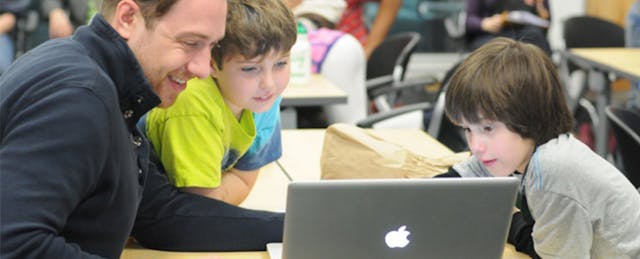Coding in K-12 schools has gained momentum over the last two years.But as we rush to bring coding to our schools, questions emerge: Do we need ‘coding’ teachers? Who will teach computer programming to our students?
Many believe that anyone can learn using the many “learn to code” startups that surround us. Programmers today are writing code--to teach coding!
What, then, is the role of the teacher in this coding movement, especially for younger students? Can all kids learn using these “learn to code’” sites without a teacher who understands coding? Will this work for all types of students?
As a computer science teacher who teaches several programming classes each week in California’s Los Altos school district (LASD), I find “learn to code” sites do work for a few of my students. These are students who are motivated and believe they will be able to program. They are willing to search for solutions and put in the time needed. My main role as their teacher is usually to suggest new projects or modifications to their existing work.
But what about the many others for whom these “learn to code” sites do not work?
The Issue
The vast majority of my students do very well on their first hour or two of coding using structured lessons, but when they start to write code for a new problem, or hit the first set of bugs, they get frustrated and need help. Sometimes, all they need is a hint, a pointer to a similar problem, or my assurance that they can solve it. In some cases, they need someone to just re-explain it a little differently.
One of my students commented recently:
“I watched the tutorials ... but I think it really helps to have someone in person to ask questions and explain to you. I learned a lot more about why things are happening too.”
Based on my 4+ years experience teaching about 500 sixth graders programming each week, I believe most younger students need a human teacher to inspire, motivate and guide them as they begin to code. If they do not have access to a teacher, they will quickly move into the “I tried coding and I cannot do it” camp. Girls and minorities, who carry the added burden of believing they do not fit the typical programmer stereotype, even more critically need a teacher at this crucial early stage.
So, maybe the question of “Do we need coding teachers?” should be reframed as “Where will we find these teachers?”
Many come to this question with the firm belief that we will never find programming teachers. After all, most computer science graduates move into higher-paying industry jobs. Maybe we must recruit part-time volunteers from the industry to run after school programs. However, if we are to bring coding into the school curriculum right along with reading, writing, and math, we cannot depend on coding club and summer camp teachers alone.
The Reality
We must build a team of dedicated teachers to support school coding programs. We do not rely on our students to absorb math from textbooks, online videos or math clubs; similarly, we cannot depend on every student to learn to code on their own, by using online tutorials and afterschool clubs. If coding becomes as fundamental as reading and writing, we need to create a system where everyone has an opportunity to learn, not just the few who probably would have learned it on their own anyway.
I used to believe finding these teachers would be impossible until this summer’s ISTE conference. As I had hoped in one of my my past EdSurge articles, the number of computer science sessions at ISTE did increase this year. In a “Learn to Code” BYOD session I conducted this year, I was pleasantly surprised to see all 140 seats in my session were filled, and there was a long line outside of teachers hoping to get in. The interest in learning to code was overwhelming.
Even better, my quick informal survey showed approximately a third of these teachers had never coded, and it was their personal mission to begin coding over the summer and then advocate bringing this subject to their schools. One of the attending teachers said in the survey, “We need more computer programming/coding options at ISTE.”
The truth is this: teachers are looking for opportunities to learn to code.
My confidence that we can find teachers within our own schools grew after my first few weeks in my new role in my own school district. This year in LASD, I am conducting professional development (PD) for computational thinking/computer programming for our new STEM teachers in our elementary schools. These STEM teachers are providing lessons for K-5 students in each of our 7 elementary schools. Most of them have never coded before, but were excited to take on this challenge.
A few months into the school year, I can confirm that these STEM teachers are not only learning to code quickly, but have been passing their enthusiasm to their students. Using Bee-Bots (cute programmable robots) in grades K-2, MIT’s Scratch and Lego WeDo in grades 3-5, these teachers have already brought some computational thinking lessons to every K-5 student in our elementary schools. These teachers are not just teaching early programming concepts, but more importantly showing their students that they are learning along themselves.
So, let’s go back to our first question: Where are the coding teachers? My answer is they are right here in our schools--even if some of them may not know it yet themselves. As PD opportunities in coding become more widely available, we will find these teachers.
If we really want to bring coding to our schools, we need to focus on the teachers first. We need to look for teachers who are lifelong learners, teachers who are ready to learn to code, the teachers who can become the ‘coding’ teachers for our schools.


